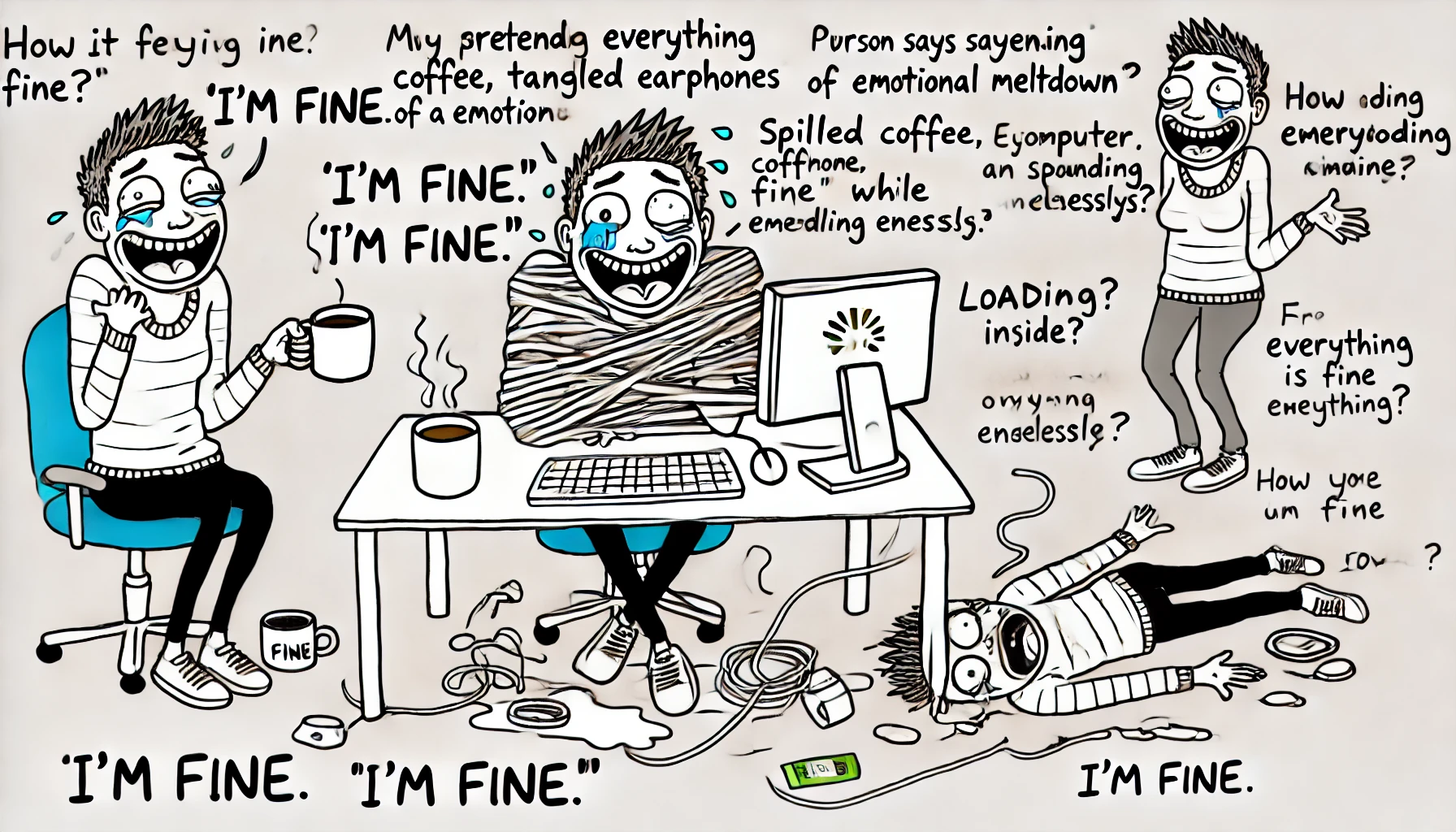London, UK – In a groundbreaking study that has shocked absolutely no one, experts have confirmed that 90% of people who respond with “I’m fine” are actually teetering on the edge of a full-scale meltdown, and it only takes one minor inconvenience—a stubbed toe, a misplaced coffee cup, or slow Wi-Fi—to send them over the edge.
The study, conducted by the Institute for Suppressed Emotions (ISE), found that the seemingly innocent phrase “I’m fine” has become a universal code for “I’m one small annoyance away from completely losing it.” The findings were revealed after researchers spent months observing human behavior in coffee shops, offices, and family gatherings, where “I’m fine” was overheard approximately 3,000 times a day.
The Fragile State of ‘Fine’
“‘I’m fine’ has become the most frequently used lie in modern conversation,” explained Dr. Alina Edgeworth, lead researcher at ISE. “People use it as a defense mechanism to avoid explaining their true emotional state, which is usually something like ‘I’m barely holding it together’ or ‘If my phone falls off the charger one more time, I will scream.’”
The study revealed that when someone says they’re “fine,” they are often silently dealing with a laundry list of annoyances, ranging from personal stress to global existential crises. “It’s the little things that really get people,” Dr. Edgeworth noted. “Someone could handle a tough workday, but the moment their favorite mug is missing, it’s all over. That’s the straw that breaks the camel’s back.”
Common ‘I’m Fine’ Triggers
Researchers have identified several common triggers that can transform a calm, collected “I’m fine” person into a full-blown stress tornado. These include:
- Wi-Fi dropping during an important Zoom call: People are fine until the Wi-Fi decides to “have a moment,” and then chaos ensues as the connection glitches right when it’s their turn to speak.
- Losing a sock in the laundry: A single missing sock has been found to increase the likelihood of an emotional outburst by 40%.
- People who walk slowly in front of you: Particularly dangerous in supermarket aisles or busy high streets, slow walkers are the silent architects of fury.
- Spilling coffee on a freshly washed shirt: No one is truly fine when their morning coffee decides to betray them.
- Phone at 1% battery: The universally agreed-upon nightmare that makes “I’m fine” immediately switch to “I’m doomed.”
Real-Life ‘I’m Fine’ Case Studies
To illustrate the findings, the study highlighted several real-life examples of individuals who claimed they were “fine” before spiraling into frustration over seemingly minor events.
Take Sarah, a 32-year-old marketing professional. After enduring a tough week at work, Sarah told her colleagues she was “fine” during a Friday afternoon meeting. Later that day, when her delivery order arrived with the wrong sauce, Sarah reportedly yelled, “THAT’S IT, I’M DONE!” while flinging her cutlery across the kitchen.
“I thought I was fine,” Sarah said later, still recovering from the sauce debacle. “But in hindsight, that was a lie. I was hanging on by a thread, and that wrong sauce was the final straw.”
Another case involved Tom, a 29-year-old who had spent the day doing household chores. After folding an entire load of laundry, Tom accidentally knocked the stack over. Witnesses reported that he stood silently staring at the pile for several minutes before muttering, “I’m fine,” and then proceeding to lock himself in the bathroom for a 30-minute “moment of reflection.”
The Importance of Recognizing the Warning Signs
According to Dr. Edgeworth, there are warning signs that someone who says “I’m fine” is about to unravel. “You’ll notice a tight smile, the kind that says, ‘If you ask me one more question, I might start crying.’ Their voice will often be a little too calm, like they’re actively suppressing the urge to throw their phone out the window.”
Experts recommend that if someone tells you they’re fine, you should tread lightly. “Offer them a cup of tea, give them some space, or simply distract them with something mindless, like funny cat videos,” said Dr. Edgeworth. “The key is not to poke the bear.”
What You Can Do If You’re ‘Fine’
For those who frequently find themselves on the verge of a meltdown but don’t want to admit it, experts suggest taking proactive measures to manage stress. Here are a few tips:
- Breathe: If someone steals your parking spot or the printer jams, take a deep breath before retaliating.
- Get outside: A five-minute walk can often turn “I’m fine” into genuine calm—or at least delay the breakdown until you get back inside.
- Vent to a friend: Find someone who won’t judge you for being irrationally angry at the fact that the TV remote is missing (again). Sometimes, a good rant can work wonders.
- Accept the chaos: Understand that life is full of minor inconveniences, and it’s okay to have moments where you’re not fine. It’s better than pretending you are.
Conclusion: Nobody Is Truly ‘Fine’
As the study has confirmed, “I’m fine” has officially become the greatest lie we tell ourselves and others. So the next time someone says they’re fine, just know they’re probably two slow walkers away from a total emotional breakdown.
And if you’re the one saying it? You might want to keep a stress ball handy—you’re going to need it.




